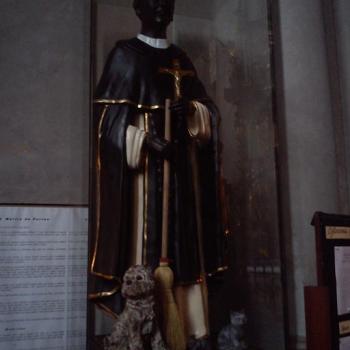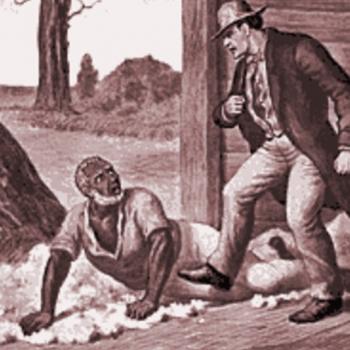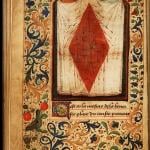 “Another day when a council was being held in Scetis, the Fathers treated Moses with contempt in order to test him, saying, ‘Why does this black man come among us?’ When he heard this he kept silence. When the council was dismissed, they said to him, ‘Abba, did that not grieve you at all?’ He said to them, ‘I was grieved, but I kept silence.’”[1]
“Another day when a council was being held in Scetis, the Fathers treated Moses with contempt in order to test him, saying, ‘Why does this black man come among us?’ When he heard this he kept silence. When the council was dismissed, they said to him, ‘Abba, did that not grieve you at all?’ He said to them, ‘I was grieved, but I kept silence.’”[1]
One reading these words today cannot but wonder who it was that was being tested, and who was it that was doing the testing. St Moses the Ethiopian (c 330 – 405), it is clear, experienced the prejudices of racism. While in this case it is possible some were indeed trying to test him to see how he would react and to see indeed how far along he had gone in his spiritual quest (according to one rendition of this story, his reaction to the test determined whether or not he should be made a priest), this kind of test could not be had if this was not the opinion of some near Moses. Indeed, the fact that this was even a question indicates that even in the so-called paradise of the fathers in the desert, prejudices remained. How was a Christian to react to them? By love and seeking to overcome the powers that be through the method established by Christ.
Racism was, and remains, one of many demonic attitudes which Christians have to confront and beat. There are two aspects of that battle: the first is to overcome the bias of racism on the inside, the second is to help others overcome it. Here, Moses had to deal with the second. His way to deal with it, to be sure, is only one way; indeed, it was for him the best way because he had to deal with another demon inside: that of anger and wrath. At this point, he showed he had conquered it. He was tested and proven to be a man of God. But what about those who tested him? What about those who took these views seriously? Were they given a test? Yes. And the fact that Moses withstood the blunt assault of these words shows how he tested his critics instead. He was grieved. When asked, he said he was; that was how they were to be tested. What did they do to make up for their hurtful words? Did the other desert fathers pass or fail Moses’ test?
It would seem as if many failed. But Moses pushed them on, constantly responding to the hate he saw around him with the mercy, peace and love of God. He tested and retested those around him, working as it were, as a man of God within the desert, to keep the monks around him honest. They were striving for perfection. That meant they had to love their fellow man, to treat him as one loved by God. When monks failed, with this he responded with love, with grace, because he knew how far he had journeyed in life, how long it took for him to find the peace of Christ within. He had not started his life with any plans of being a monk, let alone a Christian. He started his life as a slave.
St Moses was big and strong, even in his youth; this led him to becoming a strong-willed man, even as a slave. He is said to have stolen from others, and, it seems, he probably killed someone; when the rumors of his activities were heard by his master, Moses was released from his slavery (or perhaps, he escaped from it). He took off into the wilderness around the Nile. There, he found for himself among a group of brigands who chose Moses to be their leader, mostly because he was the most powerful man they knew. The cruelty and fear they brought to the community led to their being wanted by the authorities, putting them on the run. While trying to avoid capture, Moses made his way into Scetis. Stories differ as to what led him there: some say he was merely looking for a place to hide, and believed the monastic community would serve him well. Others suggest he was led there by a voice telling him that if he went to the monks and asked, he would be told about the true God. Some suggest he and his band wanted to actually stake out the monastery and rob it. Whatever reason he was led to the Scetis, one thing is certain: it had a profound impact upon him. He met with the monks and was surprised at their way of life, at the holiness of those who took him in to their home.
He stayed there, impressed, asking about the Christian faith. Through the work of Sts Isidore and Macarius the Great, St Moses was converted – he was baptized, confessed his sins, and desired to take on the challenge of the monastic life for himself. This was not an easy thing for him. He was used to an unruly lifestyle. Early on, he struggled greatly against his desires. He had to learn how to live simply. He had to learn how to give up his anger. One time, when another group of robbers attacked the monastic community, St Moses took them on single-handedly, tied them up, and asked the community what he should do with them – his temptation had been, of course, to kill them, but his monastic life told him there must be another solution. And there was. They became a monk like him.
Through the years, Moses’ hard work and effort was successful. “He so seized upon his need to be converted that with a virtuously ready spirit he turned it into a voluntary act and arrived at the highest summit of perfection.”[2] He was a new man, transformed by the grace of God. He went from a man anger and wrath to a man of peace and forgiveness. He knew how hard it had been for him to overcome the passions, and so he knew that mercy and patience was needed for everyone else. It is for this reason he was able to show his love to others, even if they didn’t show love to him. And it was for this reason his way was able to convert the hearts of many.
There are many examples of this, but one of the greatest, and most famous, is this one: one monk in his community had fallen into sin, and the other monks wanted a council to be formed to judge and condemn the man. They needed everyone there, including Moses (who did not want to go and act as a judge). Eventually, Moses went, but before he did, he got a jug of water which was leaking water, filled it up, and carried it with him. Drops of water were seen following him. Confused about this, his companions asked what it was he was doing – after all, in the desert, water was precious. His response was simple: “My sins run out behind me, and I do not see them, and today I am coming to judge the errors of another.”[3] The meaning of his words could not be clearer: at the council, the monk who had been charged with sin was forgiven and no one was willing to condemn him, knowing full well such condemnation would end up condemning themselves as well.
Moses was a natural leader, and when he was touched by God, it took on a new quality; he was chosen by St Macarius to form a new monastic community at Petra. He had by this time been ordained a priest – something unusual for the desert fathers, and he was quite the spiritual father. His exploits and holiness was famous throughout the region. The joy and peace he found in Christ overturned all the evil he had done before. But he was to be tested one final time.
While at Petra, a group of brigands found their way to the monastery, and sacked it. Moses had known in advance that they were coming, and he told his fellow monks to flee, while he, being an old man, was ready to accept his fate. He said that he had once lived his life by the sword, so he was going to fulfill the Lord’s words, and find his life taken form him by it as well. He was going to offer no resistance. Seven of his brethren wanted to stay with him and he said they could, if they so desired and were led to do so, he would not stop them, but he suggested they did not. And so they stayed there with him. When the monastery was attacked, one of those who had stayed behind could not handle it, and fled. By this action, he was able to relate to others what had occurred: Moses and the other monks didn’t resist the onslaught, and gave up their lives in peace, dying the death of martyrs—the lone monk said he had seen an angel descend with seven martyrs crowns, one for Moses and the other monks who had been killed.
“Affliction,” Moses once said, “lasts for a short time, while peace is forever, by the grace of God the Word.”[4] St Moses had experienced great afflictions in his time. He had been born a slave, and his first reaction to affliction was to overcome such affliction by being the one who did it to others. He didn’t find peace in such activity; it was a never-ending quest for excitement which offered only one way out: death. He saw that being afflicted or being the afflicter, the situation was the same: the joy and sorrow did not last. There had to be more than a life centered upon suffering. And that is what his monastic life led him to find.
For us today, he also has something to tell us about racism, and its effects upon people. It is the same story as any other affliction. In his society, what role was there for him? He couldn’t make a living. If the fathers in the desert treated him badly, the people in the city wouldn’t treat him better. It is not hard for us to understand why he took on the life of crime, even as desperation leads many to the same exploits today. The kind of society which leads people to feel as if the life of crime is the only way they can make it in the world is the kind of society no Christian can support. And yet historical racism has led to the formation of criminal structures because those who felt like outcasts had to find a way to overcome the biases which worked against their well-being.
Racism is always about a poverty of love. We must recognize it for what it is, and how it causes those affected by it to act in desperation. In a way, Moses was blessed to live at a time when the monastic movement was beginning, because this movement was made in reaction to the spiritual poverty found in the city. Moses was able to find a place which would take him in, nourish his soul, and help him find peace. Where do those who likewise suffer today go if they want to find peace? It’s the same for any who suffer unjustly. Where do those who hunger and thirst for righteousness go, when Christians have given up this hunger for the excesses of the world? At one time, Moses sought an answer for his lack of peace in the pleasures of this world. We must recognize that this is common today. We are spiritually impoverished, and do not know the answer to our angst. We seek answers in wealth, because that is what our society says is of value. We need to be shown that such a search for wealth will never satisfy, because we are looking for the wrong kind of wealth. What we must seek for is the richness of love can. That is the answer which can save both the materially impoverished as well as the spiritually impoverished. If they can encounter each other, and meet in love – really meet in love, both will work for the betterment and well being of each other. Then they can find the peace of Christ, for the way of peace is the way of love. But to find this love, one must repent of all that would lead them away from it. Moses shows us this so well. Even though we can understand the exploits of his youth, it answered nothing. Only through repentance and turning to God did Moses he find what he desired. “For godly grief produces a repentance that leads to salvation and brings no regret, but worldly grief produces death” (2 Cor 7:10). And, as St Moses shows, the way of such peace indeed led him to die with no regrets, even when it meant he had to suffer for the sake of Christ.
“Thou wast enriched with divine illumination, O Moses, and didst dispel the darkness of passions. Thou didst quench the pride of the flesh by thy vigils and prayers and didst go forth to the heavenly citadel. O holy Father, pray to Christ our God to grant us His great mercy” (Kontakion).
Footnotes
[1] The Sayings of the Desert Fathers. Trans. Benedicta Ward (Kalamazoo, MI: Cistercian Publications, 1986), 139.
[2] John Cassian, The Conferences. Trans. Boniface Ramsey, O.P. (New York: Newman Press, 1997), 122 (III.V.2).
[3] The Sayings of the Desert Fathers, 139.
[4] The Sayings of the Desert Fathers, 143.












